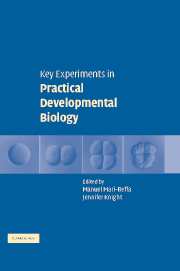Book contents
- Frontmatter
- Contents
- List of contributors
- Preface
- Introduction
- SECTION I GRAFTINGS
- SECTION II SPECIFIC CHEMICAL REAGENTS
- SECTION III BEAD IMPLANTATION
- SECTION IV NUCLEIC ACID INJECTIONS
- SECTION V GENETIC ANALYSIS
- SECTION VI CLONAL ANALYSIS
- SECTION VII IN SITU HYBRIDIZATION
- SECTION VIII TRANSGENIC ORGANISMS
- SECTION IX VERTEBRATE CLONING
- 24 The conservation of the genome and nuclear reprogramming in Xenopus
- SECTION X CELL CULTURE
- SECTION XI EVO–DEVO STUDIES
- SECTION XII COMPUTATIONAL MODELLING
- Appendix 1 Abbreviations
- Appendix 2 Suppliers
- Index
- Plate Section
- References
24 - The conservation of the genome and nuclear reprogramming in Xenopus
Published online by Cambridge University Press: 11 August 2009
- Frontmatter
- Contents
- List of contributors
- Preface
- Introduction
- SECTION I GRAFTINGS
- SECTION II SPECIFIC CHEMICAL REAGENTS
- SECTION III BEAD IMPLANTATION
- SECTION IV NUCLEIC ACID INJECTIONS
- SECTION V GENETIC ANALYSIS
- SECTION VI CLONAL ANALYSIS
- SECTION VII IN SITU HYBRIDIZATION
- SECTION VIII TRANSGENIC ORGANISMS
- SECTION IX VERTEBRATE CLONING
- 24 The conservation of the genome and nuclear reprogramming in Xenopus
- SECTION X CELL CULTURE
- SECTION XI EVO–DEVO STUDIES
- SECTION XII COMPUTATIONAL MODELLING
- Appendix 1 Abbreviations
- Appendix 2 Suppliers
- Index
- Plate Section
- References
Summary
OBJECTIVE OF THE EXPERIMENT A fundamental question in developmental biology is whether the processes of development and cell differentiation involve a stable change in the genome of cells, as was thought to be the case many years ago. An alternative idea is that the genome remains constant in cells of all different types and that the readout of the genome, namely transcription and translation, is modified according to cell type.
The first experiments to address this question and to provide most of an answer to it were carried out with amphibian eggs and embryos, using the technique of nuclear transplantation. Amphibian eggs have provided the most favoured material for embryological research since the late 1800s until the last two or three decades. The classical embryological experiments from Spemann onwards were conducted with this material. Nuclear transplantation exemplifies the value of amphibian eggs for embryological experiments involving manipulation of embryos and cells.
The aim of the experiment described below is to test the proposition that cells can embark on a particular pathway of differentiation while retaining a complete, totipotent, or at least multipotent, genome in their cells.
Further technical details required for this experiment may be found in Gurdon, 1991.
DEGREE OF DIFFICULTY From an intellectual point of view the experiment is extremely simple. It aims to replace the zygote nucleus of the fertilized egg, i.e. the egg and sperm pronuclei, with the nucleus of a cell that has clearly embarked on one direction of differentiation.
Information
- Type
- Chapter
- Information
- Key Experiments in Practical Developmental Biology , pp. 310 - 315Publisher: Cambridge University PressPrint publication year: 2005
